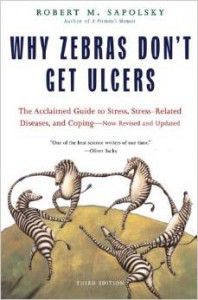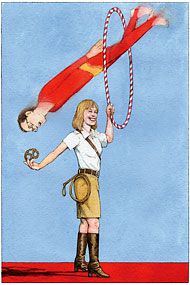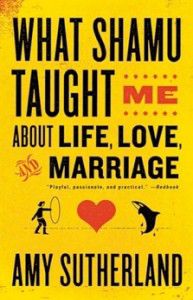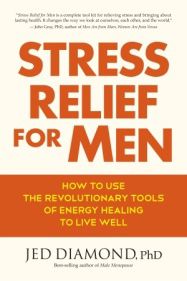How to Reduce Stress and Improve Your Love Life: Lessons from the World’s Best Exotic Animal Trainers
 Love has been a complicated presence in my life from the very beginning. Especially the challenges of love co-existing with stress. A few examples:
Love has been a complicated presence in my life from the very beginning. Especially the challenges of love co-existing with stress. A few examples:
- My parents tried, unsuccessfully, to have a baby for many years. My mother finally got pregnant through artificial insemination, a procedure that was experimental seventy-plus years ago. Being pregnant brought both joy and stress. I still remember hearing stories about her walking gingerly down 5th Avenue in New York, afraid she might lose the baby. And later, the stresses in their lives led to my father becoming increasingly manic and depressed.When I was five years old, he attempted to take his own life.
- I got married shortly after graduating college, but the marriage ended after ten years. Our marriage was stressed by two common challenges: the inability to trust, and the fear that we would be left by the other.
- A second marriage also ended badly. Well to be truthful, it started badly. The fact that she slept with a gun under her pillow should have been a tip off that she was not the best mate choice.
It\’s little wonder that later in life I wrote a book, Looking for Love in All the Wrong Places: Overcoming Romantic and Sexual Addictions.
 Other experts have recognized stress for the killer it is. The renowned Stanford biologist Robert Sapolsky wrote a wonderful book Why Zebra’s Don’t Get Ulcers: The Acclaimed Guide to Stress, Stress-related Diseases, and Coping. His thesis: to help us understand that humans are mammals like zebras, but zebras handle stress much better than we do. Sapolsky concluded that we can learn a lot from our mammalian cousins.
Other experts have recognized stress for the killer it is. The renowned Stanford biologist Robert Sapolsky wrote a wonderful book Why Zebra’s Don’t Get Ulcers: The Acclaimed Guide to Stress, Stress-related Diseases, and Coping. His thesis: to help us understand that humans are mammals like zebras, but zebras handle stress much better than we do. Sapolsky concluded that we can learn a lot from our mammalian cousins.
Like Sapolsky, Journalist Amy Sutherland also feels non-human animals have a lot to teach humans.
After seeing Shamu, the killer whale, doing amazing tricks at Sea World in San Diego, Sutherland spent a year following students at Moorpark College’s Exotic Animal Training and Management Program, which she describes as “the Harvard University for animal trainers.” What she learned there changed her life. It taught her to better understand herself, and more importantly how to improve her relationship with her husband and deepen their love.
Sutherland is a good writer and shares humorous, yet helpful, experience in two books, (Kicked, Bitten, and Scratched: Life and Lessons at the World\’s Premier School for Exotic Animal Trainers, What Shamu Taught Me About Life, Love, and Marriage: Lessons for People from Animals and Their Trainers) and a popular New York Times article, What Shamu Taught Me About a Happy Marriage.
Here are some of her insights I think are helpful to everyone who wants to improve their love life. Many people are turned off to the idea of “training” a spouse, but the truth is we train each other all the time. What animal trainers know is that we can train indiscriminately or through punishment or we can guide each other through love, understanding and connection.
 We can all identify with this experience that Sutherland shares:
We can all identify with this experience that Sutherland shares:
As I wash dishes at the kitchen sink, my husband paces behind me, irritated. “Have you seen my keys?” he snarls, then huffs out a loud sigh and stomps from the room with our dog, Dixie, at his heels, anxious over her favorite human\’s upset.
In the past I would have been right behind Dixie. I would have turned off the faucet and joined the hunt while trying to soothe my husband with bromides like, “Don\’t worry, they\’ll turn up.” But that only made him angrier, and a simple case of missing keys soon would become a full-blown angst-ridden drama starring the two of us and our poor nervous dog.
Now, I focus on the wet dish in my hands. I don\’t turn around. I don\’t say a word. I\’m using a technique I learned from a dolphin trainer. I hear him banging a closet door shut, rustling through papers on a chest in the front hall and thumping upstairs.At the sink, I hold steady. Then, sure enough, all goes quiet. A moment later, he walks into the kitchen, keys in hand, and says calmly, “Found them.”
Without turning, I call out, “Great, see you later.”
Here are a few of the insights she learned from expert animal trainers that she found effective in improving her marriage:
- The central lesson I learned from exotic animal trainers is that I should reward behavior I like and ignore behavior I don\’t.

- Quit nagging. It doesn’t work to point out faults, either with harsh words or being nice and reasonable. “After all, you don\’t get a sea lion to balance a ball on the end of its nose by nagging,” Sutherland learned. “The same goes for the American husband.”
- Reward any small approximation that is Moving in a positive direction. “I began thanking Scott if he threw one dirty shirt into the hamper. If he threw in two, I\’d kiss him. Meanwhile, I would step over any soiled clothes on the floor without one sharp word, though I did sometimes kick them under the bed. But as he basked in my appreciation, the piles became smaller.”
- Get to know the one you want to have a better relationship with. Wanting to please the one we love is natural. Make it easy for him to be successful. “I also began to analyze my husband the way a trainer considers an exotic animal. Enlightened trainers learn all they can about a species, from anatomy to social structure, to understand how it thinks, what it likes and dislikes, what comes easily to it and what doesn\’t.”
- It\’s easier to teach an “incompatible” behavior than get someone to change a behavior we don’t like. On a field trip with the students, I listened to a professional trainer describe how he had taught African crested cranes to stop landing on his head and shoulders. He did this by training the leggy birds to land on mats on the ground. This, he explained, is what is called an ‘incompatible behavior,’ a simple but brilliant concept.” Sutherland found it worked well with her husband Scott, who was always crowding her in the kitchen when she was cooking and invading her space. “At home, I came up with incompatible behaviors for Scott to keep him from crowding me while I cooked. To lure him away from the stove, I piled up parsley for him to chop or cheese for him to grate at the other end of the kitchen island. Or I\’d set out a bowl of chips and salsa across the room. Soon I\’d done it: no more Scott hovering around me while I cooked.”
- Doing nothing in response to behavior we don’t like may be the most powerful and difficult way to improve our love lives. “I followed the students to SeaWorld San Diego, where a dolphin trainer introduced me to least reinforcing syndrome (L. R. S.).” When a dolphin does something wrong, the trainer doesn\’t respond in any way. He stands still for a few beats, careful not to look at the dolphin, and then returns to work. “The idea is that any response, positive or negative, fuels a behavior. If a behavior provokes no response, it typically dies away.” Sutherland found it worked well with her husband. “It was only a matter of time before he was again tearing around the house searching for his keys, at which point I said nothing and kept at what I was doing. It took a lot of discipline to maintain my calm, but results were immediate and stunning. His temper fell far shy of its usual pitch and then waned like a fast-moving storm. I felt as if I should throw him a mackerel.”
 Humans aren’t whales, dolphins, lions, or tigers and there are many ways to improve our love lives. But we are all mammals and there are certain things that are true for us all. We all need love and respond to love. We all hunger for more positive responses and hate it when our negative qualities are pointed out to us. We might all do well to remember and practice the core learning from the world’s best exotic animal trainers: Reward behavior we like and ignore behavior we don\’t.
Humans aren’t whales, dolphins, lions, or tigers and there are many ways to improve our love lives. But we are all mammals and there are certain things that are true for us all. We all need love and respond to love. We all hunger for more positive responses and hate it when our negative qualities are pointed out to us. We might all do well to remember and practice the core learning from the world’s best exotic animal trainers: Reward behavior we like and ignore behavior we don\’t.
Jed Diamond, Ph.D. has been a marriage and family counselor for more than 40 years. He is the author of 12 books, including Stress Relief for Men, Looking for Love in All the Wrong Places, Male Menopause, and The Irritable Male Syndrome. He offers counseling to men, women, and couples in his office in California or by phone with people throughout the U.S. and around the world. To receive a free subscription to Jed’s e-newsletter go to www.MenAlive.com. If you are looking for an expert counselor to help with relationship issues, write Jed@MenAlive.com.




